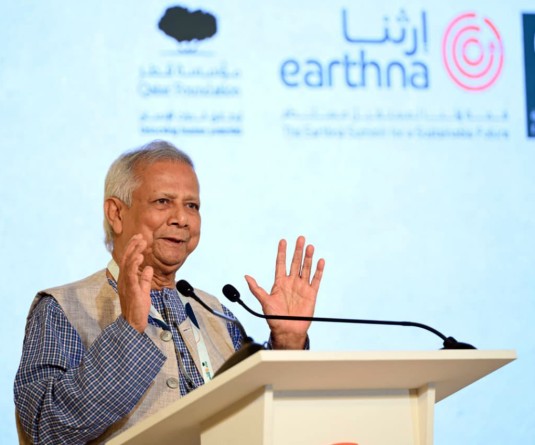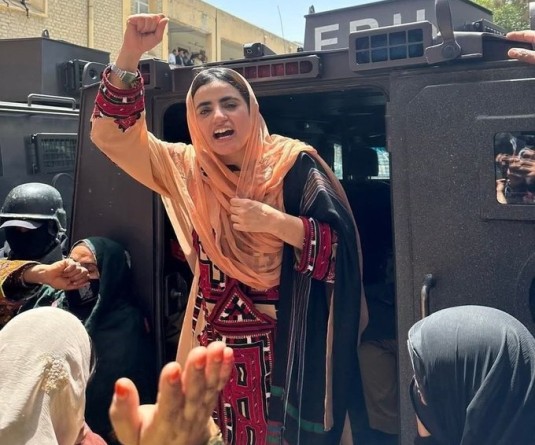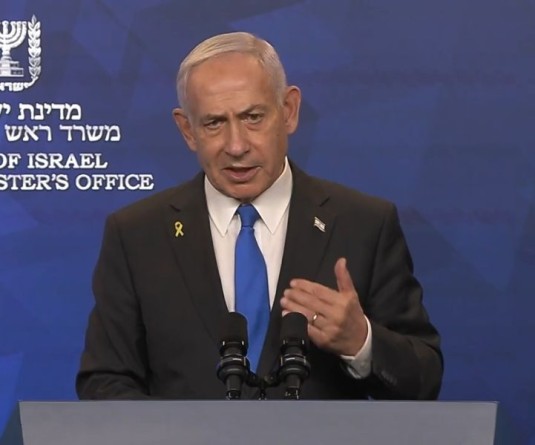
Libyan walk in front of graffiti depicting Libyan dictator Moammar Gadhafi in the rebel-held Benghazi, Libya on Saturday, July 2. (AP Photo)
BENGHAZI, July 3 (AFP): Buoyed by French arms drops and intensified NATO air strikes on the regime's frontline armour, Libya's rebel army said it is poised for an offensive that could put it within striking distance of Tripoli. The rebels' announcement late on Saturday came as a prolonged deadlock on the battlefield prompted mounting pressure from countries outside the NATO-led coalition for a negotiated solution to a conflict that has dragged on for four and a half months.
Rebel fighters are readying an advance out of their hilltop enclave in the Nafusa Mountains, southwest of Tripoli, in the next 48 hours in a bid to recapture territory in the plains on the road to the capital, spokesman Colonel Ahmed Omar Bani said. "In the next two days the (revolutionaries) will come up with answers, things will change on the front line," he said.
The rebels had pulled back last week from around the plains town of Bir al-Ghanam, some 80 kilometres (50 miles) from Tripoli, in the face of loyalist bombardment. But last week France made a series of controversial weapons drops to rebel fighters in the Nafusa Mountains and NATO has bombarded loyalist positions around Bir al-Ghanam and elsewhere on the front line around the rebel enclave. Two armoured vehicles belonging to Kadhafi forces were destroyed in the town on Friday night.
In Gharyan, another government stronghold near the mountains, NATO aircraft struck eight targets over the past four days, including a military complex used to resupply Kadhafi troops, tanks and other military vehicles, the alliance said on Saturday. In its daily report for Friday, NATO said it had launched a total of 42 strike sorties over Libya, hitting two tanks near Gharyan and two armed vehicles near Bir al-Ghanam. "March on the jebel (mountains) and seize the weapons that the French have supplied," he said.
French Foreign Minister Alain Juppe insisted that the arms were meant only to defend peaceful civilians from Kadhafi's forces and thus fell in line with UN Security Council resolutions on the conflict. "It is not a violation of the UN Security Council resolutions" under which France and other allies launched air strikes and imposed embargoes to protect civilians from Kadhafi, he said.
There was no immediate confirmation from Moscow of the talks between Russian and South African officials and representatives of the NATO-led coalition but both countries have been outspoken advocates of a negotiated solution to the conflict. "President Jacob G. Zuma will undertake a working visit to the Russian Federation to participate in the meeting of the International Contact Group on Libya to be held on Sunday, July 3, 2011," the South African foreign ministry said, adding that the visit was at Moscow's invitation.
Ministry spokesman Clayson Monyela said the talks in Russia would include all members of the contact group, but could provide no further details. The Kremlin said in a statement late Saturday that Zuma and President Dmitry Medvedev held a telephone conversation in which they agreed on a "personal meeting in the closest time" but gave no details on when it would take place. The announcement by Pretoria came shortly after Zuma returned home from an African Union summit in Equatorial Guinea, where the continental grouping adopted a plan for negotiations between the warring Libyan parties.
"We are very happy that we have reached this point, that we can now say very soon we will be launching the talks in Addis Ababa and we believe we will get the necessary support from everyone," Zuma said after the summit. But the accord reached in Equatorial Guinea produced little movement on earlier AU proposals, which have been rejected by the rebels who insist that Kadhafi must step down before they will agree to a truce. New elements in the AU plan include provisions for a multinational peacekeeping force organised by the United Nations. The bloc also says that Kadhafi has agreed to stay out of the negotiations.
Rebel fighters are readying an advance out of their hilltop enclave in the Nafusa Mountains, southwest of Tripoli, in the next 48 hours in a bid to recapture territory in the plains on the road to the capital, spokesman Colonel Ahmed Omar Bani said. "In the next two days the (revolutionaries) will come up with answers, things will change on the front line," he said.
The rebels had pulled back last week from around the plains town of Bir al-Ghanam, some 80 kilometres (50 miles) from Tripoli, in the face of loyalist bombardment. But last week France made a series of controversial weapons drops to rebel fighters in the Nafusa Mountains and NATO has bombarded loyalist positions around Bir al-Ghanam and elsewhere on the front line around the rebel enclave. Two armoured vehicles belonging to Kadhafi forces were destroyed in the town on Friday night.
In Gharyan, another government stronghold near the mountains, NATO aircraft struck eight targets over the past four days, including a military complex used to resupply Kadhafi troops, tanks and other military vehicles, the alliance said on Saturday. In its daily report for Friday, NATO said it had launched a total of 42 strike sorties over Libya, hitting two tanks near Gharyan and two armed vehicles near Bir al-Ghanam. "March on the jebel (mountains) and seize the weapons that the French have supplied," he said.
French Foreign Minister Alain Juppe insisted that the arms were meant only to defend peaceful civilians from Kadhafi's forces and thus fell in line with UN Security Council resolutions on the conflict. "It is not a violation of the UN Security Council resolutions" under which France and other allies launched air strikes and imposed embargoes to protect civilians from Kadhafi, he said.
There was no immediate confirmation from Moscow of the talks between Russian and South African officials and representatives of the NATO-led coalition but both countries have been outspoken advocates of a negotiated solution to the conflict. "President Jacob G. Zuma will undertake a working visit to the Russian Federation to participate in the meeting of the International Contact Group on Libya to be held on Sunday, July 3, 2011," the South African foreign ministry said, adding that the visit was at Moscow's invitation.
Ministry spokesman Clayson Monyela said the talks in Russia would include all members of the contact group, but could provide no further details. The Kremlin said in a statement late Saturday that Zuma and President Dmitry Medvedev held a telephone conversation in which they agreed on a "personal meeting in the closest time" but gave no details on when it would take place. The announcement by Pretoria came shortly after Zuma returned home from an African Union summit in Equatorial Guinea, where the continental grouping adopted a plan for negotiations between the warring Libyan parties.
"We are very happy that we have reached this point, that we can now say very soon we will be launching the talks in Addis Ababa and we believe we will get the necessary support from everyone," Zuma said after the summit. But the accord reached in Equatorial Guinea produced little movement on earlier AU proposals, which have been rejected by the rebels who insist that Kadhafi must step down before they will agree to a truce. New elements in the AU plan include provisions for a multinational peacekeeping force organised by the United Nations. The bloc also says that Kadhafi has agreed to stay out of the negotiations.
Hillary urges Gaddafi to deliver democracy
TRIPOLI, July 3 (AFP): US secretary of state Hillary Clinton demanded that Muammar Gaddafi deliver democracy instead of threats after the Libyan leader warned Europe of stinging attacks unless Nato halts its air war. "Instead of issuing threats, Gaddafi should put the well-being and interests of his own people first and he should step down from power and help facilitate a democratic transition," Clinton said Saturday on a visit to Nato ally Spain, the latest leg of a European tour.
In a speech broadcast by loudspeakers to thousands of supporters in Tripoli's emblematic Green Square on Friday, the Libyan leader had warned that his loyalists could launch stinging attacks on Europe like "locusts and bees." "The Libyan people are capable, one day, of taking the battle to Europe and the Mediterranean," Gaddafi said. "They could attack your homes, your offices, your families could become legitimate military targets because you have transformed our offices, headquarters, homes and children into military targets which you say are legitimate," he continued.
Spanish foreign minister Trinidad Jimenez vowed Nato would keep up the pressure on the Libyan leader, regardless of his threats. "We are working together to protect the Libyan people from the threats and violence that Gaddafi is employing against them. We will stay until we achieve our goals," she said at a news conference alongside Clinton. The top US diplomat, meanwhile, said "the Nato-led mission is on track and pressure on Gaddafi is mounting and the rebels have been gaining strength and momentum. We need to see this through."
Libyan state television said Nato air strikes had "destroyed infrastructure and claimed victims" Saturday in Al-Jafra, a desert region 600 kilometres (360 miles) south of Tripoli. Explosions were heard late at night in Tajoura, an eastern suburb of the Libyan capital, witnesses told AFP. They said the blasts were due to "coalition bombing." Some 300 children rallied in front of invited foreign media outside UN offices to condemn the air strikes. Gaddafi's regime has earned notoriety over the four decades since he seized power in 1969, arming militant groups from Northern Ireland to the Philippines, and being held responsible for a string of bombings against Western targets, including in Europe.
The Libyan leader also urged his supporters to retrieve weapons that France supplied to rebels battling his regime from bases in an armed enclave in the strategic Nafusa Mountains, southwest of the capital. "March on the jebel (mountains) and seize the weapons that the French have supplied," he said. French Foreign Minister Alain Juppe said this week's arms drop was meant only to defend peaceful civilians from Gaddafi's forces and thus fell in line with existing UN resolutions on the conflict. "It is not a violation of the UN Security Council resolutions" under which France and other allies launched air strikes and imposed embargoes to protect civilians from Gaddafi, he said.
TRIPOLI, July 3 (AFP): US secretary of state Hillary Clinton demanded that Muammar Gaddafi deliver democracy instead of threats after the Libyan leader warned Europe of stinging attacks unless Nato halts its air war. "Instead of issuing threats, Gaddafi should put the well-being and interests of his own people first and he should step down from power and help facilitate a democratic transition," Clinton said Saturday on a visit to Nato ally Spain, the latest leg of a European tour.
In a speech broadcast by loudspeakers to thousands of supporters in Tripoli's emblematic Green Square on Friday, the Libyan leader had warned that his loyalists could launch stinging attacks on Europe like "locusts and bees." "The Libyan people are capable, one day, of taking the battle to Europe and the Mediterranean," Gaddafi said. "They could attack your homes, your offices, your families could become legitimate military targets because you have transformed our offices, headquarters, homes and children into military targets which you say are legitimate," he continued.
Spanish foreign minister Trinidad Jimenez vowed Nato would keep up the pressure on the Libyan leader, regardless of his threats. "We are working together to protect the Libyan people from the threats and violence that Gaddafi is employing against them. We will stay until we achieve our goals," she said at a news conference alongside Clinton. The top US diplomat, meanwhile, said "the Nato-led mission is on track and pressure on Gaddafi is mounting and the rebels have been gaining strength and momentum. We need to see this through."
Libyan state television said Nato air strikes had "destroyed infrastructure and claimed victims" Saturday in Al-Jafra, a desert region 600 kilometres (360 miles) south of Tripoli. Explosions were heard late at night in Tajoura, an eastern suburb of the Libyan capital, witnesses told AFP. They said the blasts were due to "coalition bombing." Some 300 children rallied in front of invited foreign media outside UN offices to condemn the air strikes. Gaddafi's regime has earned notoriety over the four decades since he seized power in 1969, arming militant groups from Northern Ireland to the Philippines, and being held responsible for a string of bombings against Western targets, including in Europe.
The Libyan leader also urged his supporters to retrieve weapons that France supplied to rebels battling his regime from bases in an armed enclave in the strategic Nafusa Mountains, southwest of the capital. "March on the jebel (mountains) and seize the weapons that the French have supplied," he said. French Foreign Minister Alain Juppe said this week's arms drop was meant only to defend peaceful civilians from Gaddafi's forces and thus fell in line with existing UN resolutions on the conflict. "It is not a violation of the UN Security Council resolutions" under which France and other allies launched air strikes and imposed embargoes to protect civilians from Gaddafi, he said.






